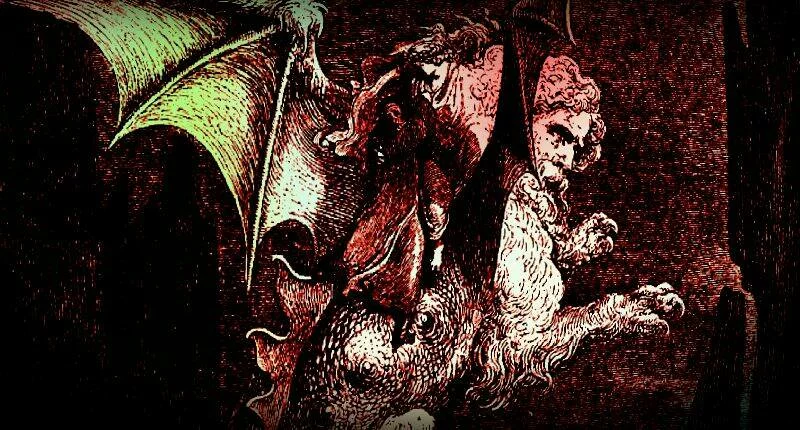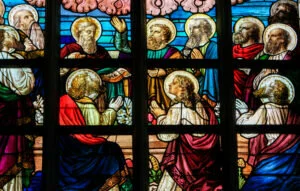Dante’s Hell is, of course, filled with monsters and monstrosities of all sorts, but the deeper into Inferno that Virgil and the pilgrim travel, the more extravagant the monstrosities get—and the more dramatic the commentary on sin.
The Disturbing Emblem of Fraud (Canto XVII)
Few sins get their own allegorical monster, but fraud is particularly egregious for Dante. It’s only slightly better than betrayal, which lands you in the deepest circle of Hell. I find Dante’s hierarchy here surprising but also insightful. One might have expected the violent, especially the murderers, to merit the worst sufferings, but compared with fraud and betrayal, violence has a directness to it. To defraud or betray, by contrast, involves a fundamental deception, convincing people that you are good when in fact you intend evil—thus Geryon has “a just man’s face, outwardly kind” but is mostly serpent.
Christ said not to fear those who can only kill the body. He went on to say we should fear God alone who has power over both body and soul, but the principle helps reveal something about Dante’s ordering of sins. The violent can only harm our bodies; the fraudulent and the betrayers wound us much more deeply. They play upon our desire to trust other people, to believe the best. They make us feel foolish for allowing ourselves to be vulnerable to another, that is, they make us doubt that the world was built on love, kindness, and goodness. In fact, part of the offense of a violent attack just is the way it makes one doubt one’s safety among one’s fellow humans. The deceiver cannot kill our souls, but they can damage them, and that, for Dante, is the worst imaginable sin.
The Twisted Sight of the Diviners (Canto XX)
These grotesquely contorted souls tried to see farther than humans are meant to see—to transcend the finitude of time and place—and so their punishment is to have their heads twisted to look, ironically, behind them; thus they have become part of the monstrous menagerie of Inferno. Dante seems less concerned with the impiety of their occult practices than with their presumption and their fraudulence (we’re still among the sins of fraud).
The pilgrim weeps to see “our human image so grotesquely reshaped” (l.22), as well he might, and I might not have much to say beyond likewise finding this a disturbing picture except that Virgil chastises Dante for his pity:
Here, pity lives when it is dead to these.
Who could be more impious than one who’d dare
To sorrow at the judgment God decrees? (28-30)
This is again the hard logic of Hell. Living persons in such a state would deserve our pity for their bodies; dead souls have traveled beyond the proper bounds of our compassion. We in this life are caught between the grand desires of our souls for good and noble deeds and the pervasive brokenness of sin that stains so much of our lives. The souls in Hell no longer experience this tension of embodiment; they have made their choice and received God’s judgment.
In fact, I read it as a reminder to us readers that part of our pity for such souls is fear for ourselves lest we wind up in the same straits.
Black Comedy, Rather Literally (Canto XXI)
Pinsky describes the barristers’ torment scene as an “adventure-farce” because of the way it combines elements of real horror with bawdy, if dark, humor. For someone who has lived most of his life in Illinois, and especially during the end of the Blagojevich years, barristry, or the selling of public office, rings close to home. No doubt there are more subtle (or perhaps more egregious) forms of it happening in other states, but when it’s your state and national news you feel differently about it. The problem here, of course, is that barristry circumvents the whole point of the political process, viz., to promote the common good. It’s an outrage to justice but also to personal morals: bad people buying their way into office could mean bad policies for me.
The lake of pitch suggests to me the old tar and feather punishment we associate with mob justice. Add to this the humiliation of the demons’ mockery, plus the hooks they use to push the sinners back beneath the surface like cooks (in Dante’s metaphor) steeping meat in a cauldron, and you have a pretty grizzly scene. Maybe I still get confused between my reactions to the living and the dead, but despite knowing these souls don’t need to breathe, I find this image suffocating—being trapped beneath that thick black goo. For a politician, perhaps the worse part of it is having your whole self effaced from public view and all the gifts, benefits, and attention you received in life turned to the jeers and prodding of the demons.
As Christ said of those who trump their virtues in public, “they have received their reward.” The part of me that hopes to have learned something from this journey wants to think, “May it stand them in good stead at the bottom of the black lake,” but another part of me (maybe not so different a part) prays, “Lord keep me from such a fall.”








Comments
Be the first one to make a comment!